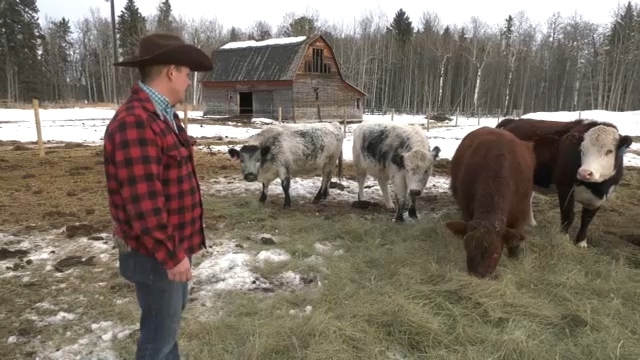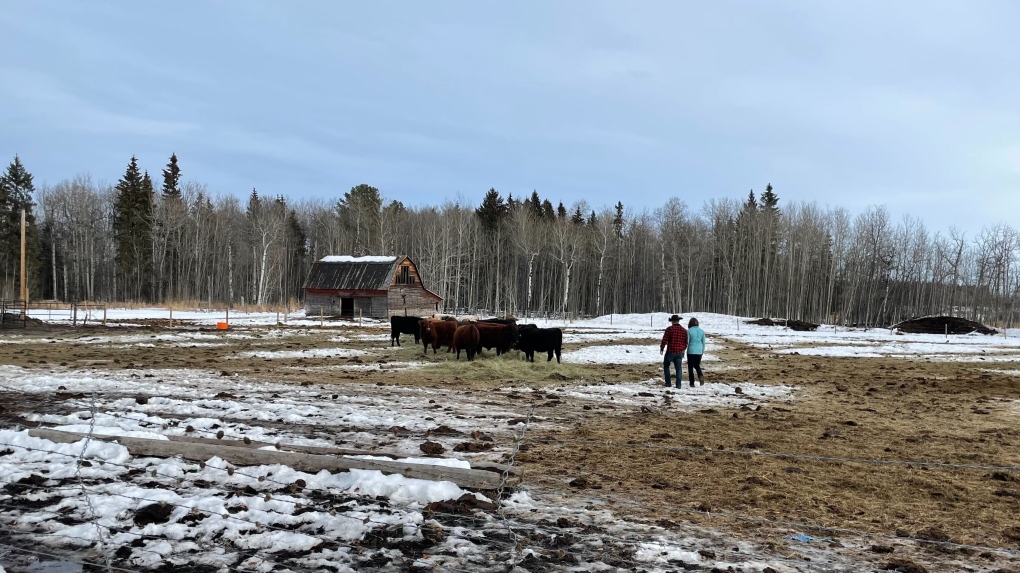Ranchers unsure about future of industry as many make less than minimum wage
A growing trend of ranchers deciding to leave the industry as the cost of doing business continues to surge has some calling for industry change and awareness of what farmers go through to get meat to market.
Sean McGrath, a fifth-generation rancher near Lloydminster, told CTV News Edmonton that consecutive bad weather seasons and the rising cost of doing business drive many families from the industry.
Farms in southern Alberta have been dealing with three years worth of weather-related complications, McGrath added, with last year's drought impacting his northern Alberta ranchlands.
In addition, the rising cost of feed supplies and fuel is forcing some farmers to reduce their herd sizes, McGrath said.
"It's been a squeeze for everyone," McGrath said, who also is a ranching consultant.
A presentation he recently saw from the Canadian Roundtable for Sustainable Beef showed the average return for a 200-cow herd is now just under $18,000.
"That is the average," McGrath said. "So there are operations that do much better and operations that do much worse. It's still a concerning number."
McGrath says some ranchers can have a $2 to $5 million investment tied into their farm, depending on its size.
"You start to think about if you make $15 an hour working after school at Tim Horton's, you would gross that $18,000 in a year," he added.
"Depending on family and debt load and ties to the land and personal goals and all those types of things, I don't know what the industry is going to look like in the next 20 years."
- Boomtown no more: How Alberta's economy has changed, in spite of sky-high oil prices
- Dry temps speed up harvest in Alberta but degrade soil moisture levels
'A LOT OF PEOPLE ARE CHOOSING TO EXIT'
According to Statistics Canada, cattle herds in the country fell to the lowest recorded levels since July. 1, 1988.
Since 2005, cattle inventories have declined year-over-year while Canadian hog and sheep generally increased.
As of this July 1, Canadian farmers held 12.3 million cattle and calves, a 2.8 per cent decline from last year — the most significant year-over-year decrease since summer 2015.
The Canadian beef cow inventory has declined for three consecutive years, with beef heifers for breeding experiencing a 7.4 per cent decline in 2022 compared to last year.
While Alberta records the largest cattle inventories, Stats Canada data indicates, western Canadian provinces saw the largest declines.
Manitoba saw a minus 6.9 per cent herd reduction, with Saskatchewan and Alberta reporting minus 4.2 per cent and two per cent reductions, respectively.
The number of cattle farms have also declined since 2004, with the national statistics agency attributing it to "business consolidations."
"It's kind of to a point where you either need to decide you are going to put some of your own money into the business, so an off-farm job, or you are going to exit, or you are going to adapt your business to be profitable," McGrath said.
"A lot of people are choosing to exit," he added.
- Investors, lending policies increasing farmland prices: report
- 'A huge crop with nothing in it': Fort Macleod farmer disappointed with 2022 harvest
That should be concerning to consumers, who are sometimes paying record prices for beef at the grocery, but also to the greater Alberta economy, McGrath explained.
"The industry employs a lot of people when you start going down the chain," he said, adding that includes workers involved with meat processing, transportation, retailing and marketing.
"It's a major employer," McGrath said. "It contributes a lot to the economy, and the other thing that I think should be a concern is that ranchers punch above their weight class when it comes to some of the environmental preservation (actions, like) maintaining biodiversity, maintaining some of these native rangelands that do water filtration, carbon sequestration."
'THE PROFIT MARGIN IS VERY SLIM'
Shelby Blosky has been involved in ranching for 15 years alongside her husband Shayne. The pair own and operate Double S Ranch near Carnwood, Alta.
In her time in the industry, Shelby says she's seen countless ranchers decide to shut their farms down for good.
"There's a lot of people that are just saying enough is enough, especially the older generation," she told CTV News Edmonton. "It's too much. It's too expensive. You are spending more than you are bringing in."
The pair decided to forgo the traditional style of cattle raising and selling to feedlots by selling directly to customers.
"Raising the calves up and selling them to the commercial market in the fall just didn't make sense," Shelby said.
- Merritt, B.C., ranchers still recovering from triple natural disaster
- Farmers forced to sell their cows as drought conditions worsen across U.S.
- Sask. ranchers call for investigation into cattle and beef pricing
After buying young calves, the Bloskys raise them and send them to the butcher for processing once they are ready. Then they get the meat back, package it and sell it directly to consumers.
"The profit margin is very slim," she added. "We struggle to pay bills sometime, but we get through it."
"We try and be competitive with the grocery store as much as we can while still making it make sense," Shayne echoed. "If you worked out my hourly rate doing this, I am probably making much less than minimum wage."
 Shayne Blosky watches over some of his herd at his family farm near near Carnwood, a central Alberta community approximately 72 kilometres west of Leduc (CTV News Edmonton/Cam Wiebe).
Shayne Blosky watches over some of his herd at his family farm near near Carnwood, a central Alberta community approximately 72 kilometres west of Leduc (CTV News Edmonton/Cam Wiebe).
Shelby tries to engage and build a client base using social media and the couple are now building a small retail store at the corner of their farm so those in the area and travelling along the highway can stop in to buy meat.
"We just keep pushing as we can," Shelby said.
'PEOPLE NEED TO EAT'
McGrath believes the entire industry will need to pivot and adapt to ensure farmers can make a liveable wage.
"There's a lot of steps in the middle between when a cow exits my yard and shows up on a shelf in Costco for example," McGrath said. "There's a lot of people in the middle and a lot of families that provide that labour effort in the middle."
"I've sold entire cows for less than the price of that loin (in the grocery store)," he added. "The percentage that the producer gets is small in that total cost and it's also driven globally by prices and forces (like fuel or feed)."
- Alberta Opposition demands meetings with grocery chains over affordability concerns
- To buy or not to buy: When to go generic at the grocery store
For the Bloskys, no matter what happens, they are sticking with ranching.
"We need cattle," Shelby said. "We need producers and it needs to make sense for the producers to get into cattle or to grow their herds. People need to eat."
"Farmers are forever optimistic; next year's going to be better," she added with a smile. "That's kind of what we live on."
 Shelby Blosky and her husband Shayne watch their herd at Double S Ranch (CTV News Edmonton/Amanda Anderson).
Shelby Blosky and her husband Shayne watch their herd at Double S Ranch (CTV News Edmonton/Amanda Anderson).
Her husband says he couldn't imagine doing any other job, as he adores the ranching lifestyle.
"This is what I love to do," Shayne added. "We slowly build ourselves every year. It would be great if we could multiply that a little bit quicker, but I don't want to lose what we've gained."
With files from CTV News Edmonton's Amanda Anderson
CTVNews.ca Top Stories

What to know about avian influenza in dairy cows and the risk to humans
Why is H5N1, or bird flu, a concern, how does it spread, and is there a vaccine? Here are the answers to some frequently asked questions about avian influenza.
'I was scared': Ontario man's car repossessed after missing two repair loan payments
An Ontario man who took out a loan to pay for auto repairs said his car was repossessed after he missed two payments.
opinion The special relationship between King Charles and the Princess of Wales
Royal commentator Afua Hagan writes that when King Charles recently admitted Catherine to the Order of the Companions of Honour, it not only made history, but it reinforced the strong bond between the King and his beloved daughter-in-law.
New Norad commander calls Canada's defence policy update 'very encouraging'
American troops will be spending more time training in the Far North, the new commander of Norad says, a strategy that fits 'hand-in-glove' with Canada's renewed focus on Arctic defence.
$70M Lotto Max winners kept prize a secret from family for 2 months
During a special winner celebration near their hometown, Doug and Enid shared the story of how they discovered they were holding a Lotto Max ticket worth $70 million and how they kept this huge secret for so long.
Are Canadians getting sick from expired food?
A new survey by Dalhousie University's Agri-Food Analytics Lab asked Canadians about their food consumption habits amid rising prices.
Documents reveal Ottawa's efforts to get Loblaw, Walmart on board with grocery code
It was evident to the federal government as early as last fall that Loblaw and Walmart might be holdouts to the grocery code of conduct, jeopardizing the project's success.
Charlie Woods, son of Tiger, shoots 81 in U.S. Open qualifier
Charlie Woods failed to advance in a U.S. Open local qualifying event Thursday, shooting a 9-over 81 at Legacy Golf & Tennis Club.
Improve balance and build core strength with this exercise
When it comes to cardiovascular fitness, you may tend to focus on activities that move you forward, such as walking, running and cycling.
































